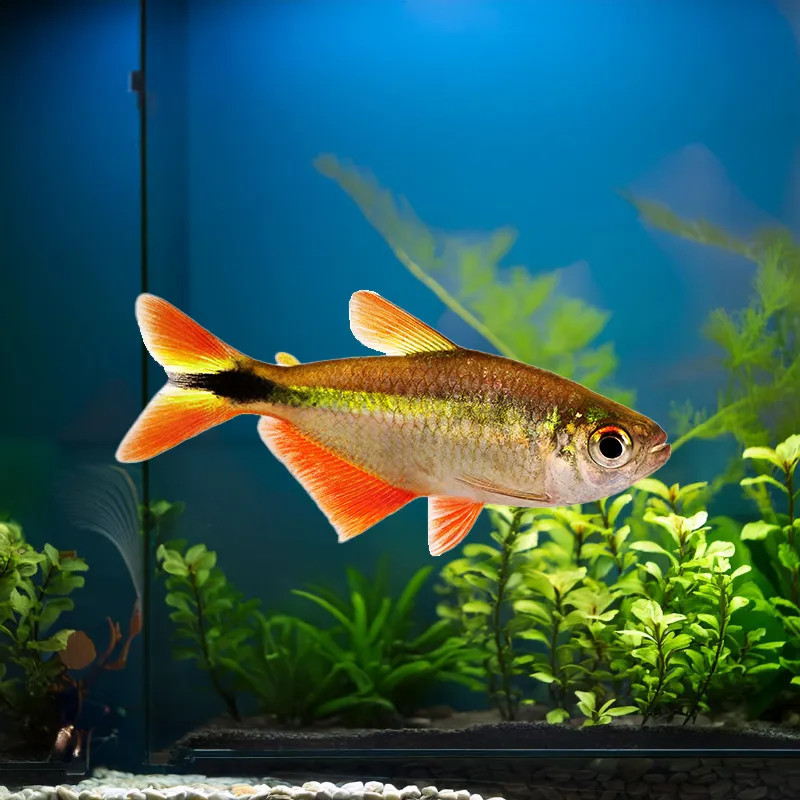Stocks Available
Cardinal Tetra
SKU:109023
HYPHESSOBRYCON COLUMBIANUS
1 INCH

Stock Available
Introduction • Common Name: Buenos Aires Tetra • Natural Habitat: This species is native to the freshwater rivers and streams of South America, particularly in Argentina, Paraguay, and Brazil. They are commonly found in slow-moving waters with ample vegetation. Physical Characteristics • Appearance: Buenos Aires Tetras have an elongated, silver body with a distinctive black stripe running from the middle of the body to the tail, where it ends in a red spot. The tail fin is typically red, and they may also have red-tinted anal and dorsal fins, adding to their vibrant look. • Size: These tetras can grow up to 2.75 inches (7 cm), making them medium-sized fish for a community aquarium. • Lifespan: With proper care, Buenos Aires Tetras can live up to 5 years or more. Habitat Requirements • Tank Size: A minimum tank size of 20 gallons is recommended for a small group, but larger tanks are ideal to accommodate their active swimming behavior. • Water Conditions: o Temperature: They prefer water temperatures between 64-82°F (18-28°C), making them more tolerant of cooler conditions compared to other tropical species. o pH: They thrive in neutral to slightly acidic water, with a pH range of 6.0 to 8.0. o Water Hardness: Moderate hardness, from 4 to 25 dGH. • Aquascaping: Buenos Aires Tetras are active swimmers that appreciate open space for swimming but also enjoy hiding places. Dense plant cover is less ideal for this species, as they tend to nibble on plants. Consider using hardy or artificial plants and providing rocks or driftwood for hiding. Diet • Primary Diet: Buenos Aires Tetras are omnivores. They readily eat high-quality flake food, pellets, and other prepared fish foods. • Supplemental Feeding: Their diet should be supplemented with live or frozen foods like bloodworms, daphnia, and brine shrimp to support their health and coloration. • Feeding Frequency: Feed small amounts twice a day to prevent overfeeding and maintain water quality. Behavior and Compatibility • Temperament: Buenos Aires Tetras are lively and generally peaceful but can become fin nippers, particularly if they are not kept in large enough groups or if their tank mates have long fins. It’s best to keep them in groups of at least 6-8 to reduce aggression and prevent them from nipping at other fish. • Suitable Tank Mates: They do well with other fast-moving or similarly sized fish like barbs, danios, and other tetras. Bottom-dwellers like Corydoras catfish also make good companions. • Incompatibilities: Avoid housing them with slow-moving or long-finned fish, such as bettas or angelfish, as they may become targets for nipping. Care Level • Difficulty: Buenos Aires Tetras are relatively hardy and easy to care for, making them suitable for beginner aquarists. They tolerate a range of water conditions, which adds to their popularity. • Maintenance: Regular water changes of around 20-25% per week are recommended to maintain water quality. They are less demanding about specific water parameters, which makes them adaptable to a variety of setups. Breeding • Reproduction: Buenos Aires Tetras are egg layers and can be bred in captivity. A separate breeding tank with slightly warmer water and fine-leaved plants or a spawning mop will encourage spawning. • Breeding Behavior: Males will chase the females during courtship. After spawning, adults should be removed from the tank, as they may eat the eggs. Eggs typically hatch within 24-36 hours, and fry become free-swimming after a few days. • Fry Care: Feed the fry infusoria or liquid fry food until they are large enough to eat finely crushed flakes or baby brine shrimp. Health and Disease • Common Issues: Like most tetras, Buenos Aires Tetras are prone to common freshwater fish diseases such as ich and fin rot, particularly if water conditions are poor. • Prevention: Maintaining good water quality, avoiding overcrowding, and feeding a varied diet will help prevent health issues. Sustainability and Conservation • Wild Population: Buenos Aires Tetras are not currently at risk in the wild and are widely bred in captivity for the aquarium trade. • Conservation Status: They are not listed as endangered, and most specimens sold in the aquarium trade are captive-bred. Conclusion The Buenos Aires Tetra is a robust, active fish that brings life to any aquarium. Its hardiness and adaptability make it an excellent choice for beginner and experienced aquarists alike. With proper care and attention, these vibrant fish can thrive and become an engaging addition to community tanks.
Data sheet
16 other products in the same category:
Customers who bought this product also bought: